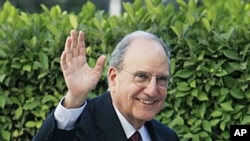President Barack Obama has announced the resignation of his Middle East envoy, George Mitchell. This comes as Israel-Palestinian peace efforts remain at an apparent standstill, and a week before Israel's prime minister is scheduled to come to the White House.
A former U.S. senator known among other things for his major role in helping negotiate the Northern Ireland peace accords, Mitchell was one of President Obama's first appointments in January of 2009.
In his brief letter to the president, released by the White House, he noted that he had always intended to serve for two years, adding that he strongly supported President Obama's vision of comprehensive peace in the Middle East.
In a written statement, President Obama praised Mitchell as a "tireless advocate for peace" and said his "deep commitment to resolving conflict and advancing democracy has contributed immeasurably to the goal of two states living side by side in peace and security."
Mr. Obama said the U.S. remains committed to peace in the Middle East and to building on Mitchell's hard work and progress toward achieving that goal. The president said Secretary of State Hillary Clinton asked Deputy Middle East Envoy, David Hale, to serve as Acting Envoy.
The White House also released Secretary Clinton's statement, which praised Mitchell for taking on hard challenges and said the U.S. would "carry forward his commitment to pursue a comprehensive peace in the Middle East."
After a high profile roll out of his Mideast peace drive last year, President Obama and Mitchell had been frustrated by a lack of progress. Israelis and Palestinians briefly held direct negotiations, but the talks broke down over the issue of Israeli settlement construction in east Jerusalem.
Mitchell's resignation comes a week before Israeli Prime Minister Benjamin Netanyahu is scheduled to visit Washington. He will meet with President Obama next Friday, and deliver an address to the U.S. Congress the following week.
Speculation continues about whether Mr. Netanyahu will use that speech to U.S. lawmakers to present any new significant proposals aimed at reviving the peace process with Palestinians.
Israeli and other media reports have said that has become even less likely in the wake of the reconciliation agreement between the Palestinian Authority and Hamas.
President Obama is due to meet this coming Tuesday with another important player in Mideast peace efforts, Jordan's King Abdullah.
On Thursday, President Obama is scheduled to deliver a major address about the Middle East and the wave of uprisings by protesters seeking political change and the harsh crackdowns in places like Syria and Yemen.
White House Press Secretary Jay Carney told reporters Friday that Mr. Obama has "some important things to say" about upheaval in the region and the U.S. response.
Carney said Mr. Obama will call on governments to respond to people's demands through peaceful political dialogue, and note that Democratic movements are a repudiation of the philosophy of al-Qaida.
Mr. Obama's speech will be delivered at the State Department, and will come on the eve of his talks the next day with Prime Minister Netanyahu.
The White House is not talking about what President Obama may say in his speech about Israel-Palestinian peace efforts.
Obama Middle East Envoy Resigns




